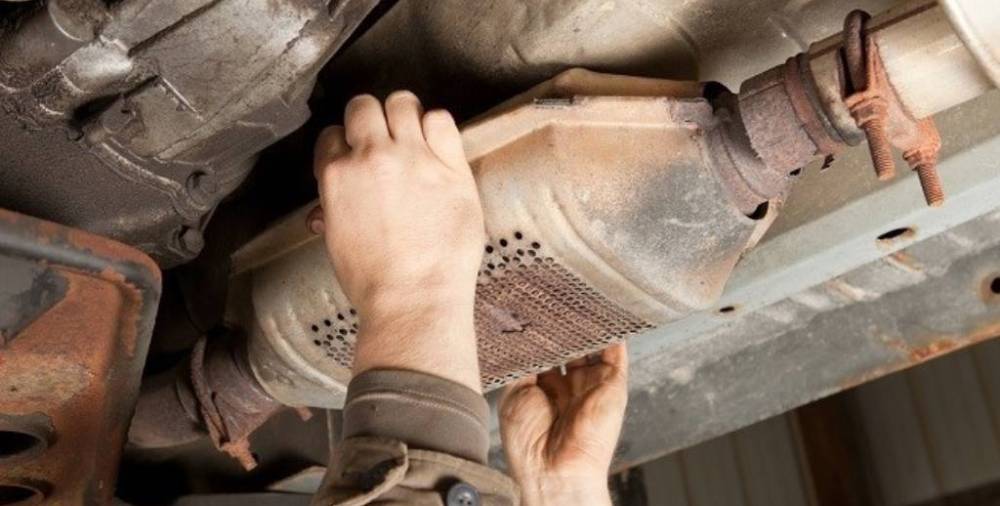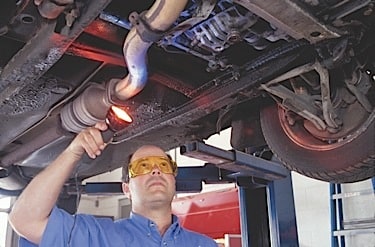Are you experiencing a decrease in your vehicle’s performance or a sudden increase in emissions? If so, it may be time to consider the possibility of needing a new catalytic converter. This crucial component of your car’s exhaust system plays a vital role in reducing harmful emissions and ensuring optimal engine performance. In this guide, we will explore the signs that indicate your catalytic converter may be failing, providing you with the knowledge you need to make an informed decision and keep your vehicle running smoothly.
Imagine cruising down the road, wind in your hair, and a smile on your face, only to be interrupted by a sudden check engine light glaring back at you. It’s frustrating, isn’t it? Well, fear not, for that pesky light may be trying to tell you something important – that your catalytic converter could be on the verge of giving up. But how can you be sure? In this comprehensive guide, we will delve into the telltale signs that it’s time to bid farewell to your old catalytic converter and welcome a new one into your vehicle’s life. So buckle up and get ready to become a detective, as we uncover the clues that will help you determine if a new catalytic converter is in your future.
How to Know if You Need a New Catalytic Converter:
- Listen for unusual noises coming from your vehicle’s exhaust system.
- Check for a decrease in engine performance or acceleration.
- Look for a rotten egg smell coming from the exhaust.
- Inspect the catalytic converter for physical damage or rust.
- Use a scan tool to check for any trouble codes related to the catalytic converter.

How to Know if You Need a New Catalytic Converter
Introduction
Are you experiencing issues with your vehicle’s performance or fuel efficiency? It’s possible that your catalytic converter may be the culprit. In this article, we will guide you through the steps to determine if you need a new catalytic converter. By following these simple steps, you can save yourself from potential breakdowns and costly repairs.
Step 1: Check Engine Light
One of the first signs that your catalytic converter may need to be replaced is the illumination of the check engine light on your dashboard. The check engine light is a warning from your vehicle’s onboard diagnostics system that something is wrong. To determine if the catalytic converter is the cause, you will need to have the vehicle’s diagnostic codes read by a professional mechanic or by using an OBD-II scanner yourself.
If the diagnostic codes indicate a catalytic converter-related issue, such as a low catalytic converter efficiency code, it’s a strong indication that you need a new catalytic converter. However, it’s important to note that other factors like oxygen sensor malfunctions or exhaust leaks can also trigger similar codes, so further inspection is required.
Step 2: Reduced Performance and Fuel Efficiency
A failing catalytic converter can significantly impact your vehicle’s performance and fuel efficiency. If you notice a decrease in acceleration, difficulty in reaching higher speeds, or a loss of power, it may be due to a faulty catalytic converter. Additionally, you may experience poor fuel efficiency, with more frequent trips to the gas station than usual.
It’s important to consider other potential causes for these symptoms as well, such as a clogged fuel filter or spark plugs, but if these components are ruled out, a failing catalytic converter becomes a likely culprit.
Step 3: Rattling Noises
Another potential indication of a failing catalytic converter is the presence of rattling noises coming from the exhaust system. This noise is often caused by a loose or broken internal component within the catalytic converter. The rattling noise may become more pronounced during acceleration or when the vehicle is idle.
If you notice any unusual noises coming from your exhaust system, it’s important to have it inspected by a qualified mechanic to determine if a new catalytic converter is needed.
Frequently Asked Questions
If you suspect that your catalytic converter may need to be replaced, it’s important to gather as much information as possible before making a decision. To help you understand when it might be necessary to replace your catalytic converter, we have compiled a list of frequently asked questions below.
Question 1: What are the signs of a failing catalytic converter?
A failing catalytic converter can display a variety of symptoms. One of the most common signs is a decrease in engine performance. If you notice that your vehicle is experiencing a loss of power or struggles to accelerate, it could indicate a failing catalytic converter. Additionally, a failing converter may cause your engine to misfire or stall.
Another sign to look out for is an increase in fuel consumption. A failing catalytic converter can lead to reduced fuel efficiency, resulting in more frequent trips to the gas station. Furthermore, a failing converter can trigger the check engine light on your dashboard. If this warning light illuminates, it is advisable to have your vehicle inspected by a professional mechanic.
Question 2: Can a faulty oxygen sensor mimic catalytic converter failure?
Yes, a faulty oxygen sensor can mimic the symptoms of a failing catalytic converter. The oxygen sensor plays a crucial role in monitoring the levels of oxygen in the exhaust gases. If the sensor fails, it can send inaccurate readings to the engine control unit, which may result in poor engine performance and increased emissions.
Before assuming that your catalytic converter needs to be replaced, it is recommended to have the oxygen sensor checked. A qualified mechanic can use diagnostic tools to assess the sensor’s functionality and determine if it needs to be replaced.
Question 3: Can a clogged catalytic converter cause overheating?
Yes, a clogged catalytic converter can contribute to engine overheating. As the converter becomes restricted or blocked, it can impede the flow of exhaust gases. This restriction can cause excessive heat buildup, leading to engine overheating.
If you notice that your engine temperature is consistently high or that your vehicle is frequently overheating, it is essential to have your catalytic converter inspected. A professional mechanic can diagnose whether the converter is clogged or if there are other underlying issues causing the overheating.
Question 4: How long does a catalytic converter typically last?
A catalytic converter’s lifespan can vary depending on various factors, such as driving conditions and maintenance practices. On average, a properly functioning catalytic converter can last between 70,000 to 100,000 miles. However, it is not uncommon for some converters to last even longer.
Regular maintenance and addressing any potential issues promptly can help prolong the lifespan of your catalytic converter. It is important to follow the manufacturer’s recommendations for maintenance and have your vehicle inspected regularly to detect any potential problems early on.
Question 5: Can a damaged catalytic converter be repaired?
In most cases, a damaged catalytic converter cannot be repaired and will require replacement. The internal components of the converter, such as the catalyst substrate, are not easily repairable. If the converter is damaged due to physical impact, overheating, or other factors, it is best to replace it to ensure proper functioning of your vehicle’s emissions control system.
Attempting to repair a damaged catalytic converter can lead to inadequate emissions control and may result in your vehicle not passing emissions tests. It is advisable to consult with a professional mechanic who can assess the damage and recommend the appropriate replacement for your specific vehicle.

By recognizing the importance of a properly functioning catalytic converter and being aware of the signs that indicate its deterioration, you can ensure the longevity and optimal performance of your vehicle. Remember, a failing catalytic converter not only impacts your car’s emissions but can also result in decreased engine power and potential damage to other components. Stay vigilant and proactive in maintaining your vehicle’s health, and don’t hesitate to seek professional advice when needed. With these measures in place, you can drive confidently knowing that you are taking the necessary steps to keep your vehicle running smoothly and efficiently for years to come.
- Turbocharging Specialists: Boosting Power to the Extreme! - May 2, 2024
- Classic Car Restoration: Timeless Beauty Rediscovered - May 2, 2024
- Boost Your Ride: Battery Upgrades Powering Performance - May 2, 2024
